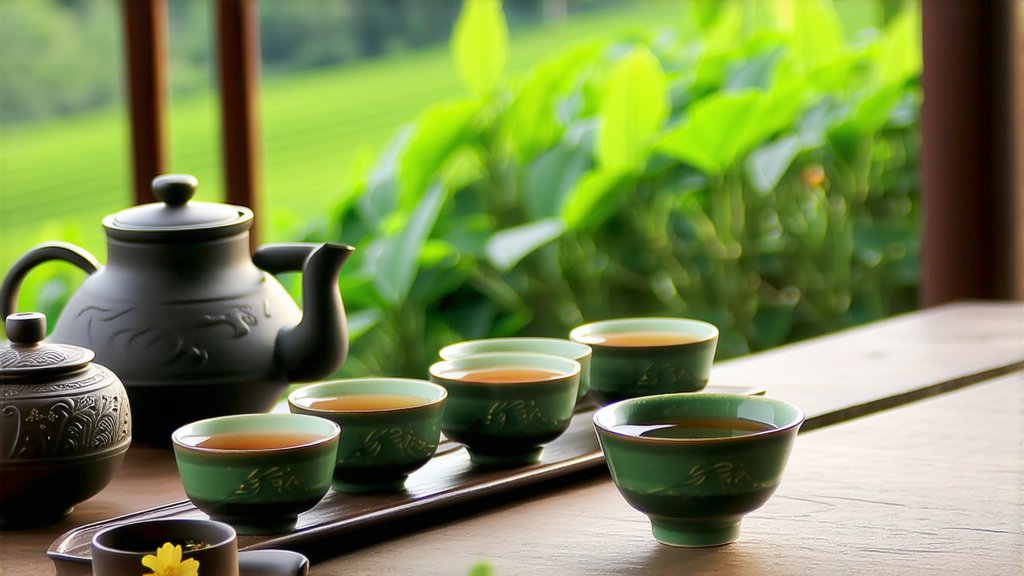
Anhua Black Tea, hailing from the Anhua region in Hunan Province, China, stands as a testament to the rich tapestry of Chinese tea culture and history. This dark tea variety, also known as Fuzhuan or Dark Ganquan, has been cherished for centuries, not only for its unique flavor profile but also for its reputed health benefits. As we delve into the depths of this exquisite beverage, let us uncover the historical roots, varieties, meticulous craftsmanship, and nuanced art of appreciating Anhua Black Tea.
A Glimpse into History
The origins of Anhua Black Tea trace back over a millennium to the Tang Dynasty (618-907 AD), when it was initially used as a form of currency due to its high value and long shelf life. By the Ming Dynasty (1368-1644 AD), Anhua had established itself as a significant tea-producing center, with its tea becoming a staple in the imperial court. The tea's journey along the ancient Tea Horse Road facilitated cultural exchanges between China and Tibet, further embedding its prominence in history.
Varieties and Characteristics
Anhua Black Tea encompasses several distinct types, each with its own unique characteristics:
-
Tianjian Tea: Known for its brick-like appearance, Tianjian undergoes a complex fermentation and aging process that imparts earthy, woody notes with hints of dried fruit.
-
Gongfu Tea: Smaller and more refined than Tianjian, Gongfu tea offers a smoother texture and a sweeter taste, often described as having floral undertones.
-
Qianliangcha: Literally translated as "Thousand Two Tea," this variety is renowned for its ability to age gracefully over decades, developing deep, complex flavors reminiscent of dried plums and spices.
The Art of Craftsmanship
The production of Anhua Black Tea is an intricate dance between tradition and nature. It begins with the careful selection of mature leaves from the Camellia sinensis plant. These leaves are then subjected to a series of steps that transform them into the revered black tea:
-
Fixation: Freshly picked leaves are quickly heated to halt oxidation, preserving their natural green color and aroma.
-
Rolling: The leaves are rolled to release juices and initiate fermentation.
-
Fermentation: Unlike other teas, Anhua Black Tea undergoes a secondary fermentation process where microorganisms play a crucial role in developing its distinctive flavor profile. This can take several months to years, depending on the desired outcome.
-
Drying: Finally, the tea is slowly dried to lock in its flavors and prepare it for aging.
Appreciating the Nuances
To truly appreciate Anhua Black Tea, one must engage in a mindful tasting ritual:
-
Warm the Cup: Begin by warming your teapot and cup with hot water to enhance the tea's aroma.
-
Measure and Infuse: Use approximately 5 grams of tea per 150ml of water. Steep the tea at around 95°C (203°F) for 3-5 minutes, adjusting based on personal preference and the specific tea's age.
-
Observe: Take note of the tea's color, which ranges from amber to deep brown, and its clarity.
-
Smell: Inhale the aroma before tasting, identifying subtle notes of earthiness, sweetness, or even a hint of smokiness.
-
Taste: Savor the tea slowly, allowing its flavors to unfold on your palate. Notice the initial taste, mid-mouth feel, and aftertaste, which should be smooth and lingering.
-
Reflect: Contemplate how the tea's characteristics reflect its history, craftsmanship, and the terroir of Anhua.
Health Benefits and Cultural Significance
Beyond its sensory pleasures, Anhua Black Tea boasts numerous health benefits. Rich in antioxidants, vitamins, and minerals, it aids digestion, supports cardiovascular health, and promotes weight loss. Its caffeine content provides a gentle energy boost without the jitters associated with coffee.
In Chinese culture, sharing a pot of Anhua Black Tea signifies respect, friendship, and a shared appreciation for life's finer moments. The tea embodies the philosophy of harmony between humans and nature, encouraging mindfulness and tranquility in a fast-paced world.
In conclusion, Anhua Black Tea is more than just a beverage; it is a living testament to China's profound tea heritage. From its storied past to its meticulous production and nuanced enjoyment, every aspect of this dark tea invites exploration and appreciation. Whether you are a seasoned tea connoisseur or a curious newcomer, embarking on the journey of Anhua Black Tea promises a deeply enriching experience that transcends time and borders.